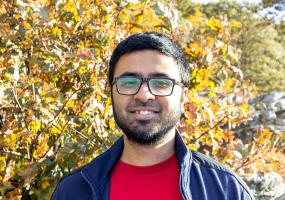
Md. Khairul Islam, a Ph.D. computer science student at the University of Virginia’s School of Engineering and Applied Science, won first place in the graduate paper cohort for the COVID Information Commons Student Paper Challenge at Columbia University in New York City.
Islam’s paper, guided by his adviser associate professor Judy Fox and funded by NSF, dives into COVID-19 transmission patterns to examine how different age groups are impacted. And while we often think of older adults as being the hardest hit, Islam’s research found something surprising: young adults between 18-29 were among the most influential in spreading the virus.
Using a smart, deep learning tool called the Temporal Fusion Transformer (TFT), Islam and his team figured out how COVID-19 spread across different age groups over time. Think of TFT as a GPS for data. It not only maps out where things are headed but also explains the route. By analyzing information from 3,142 U.S. counties, the team could predict where COVID-19 would hit hardest and track daily trends to pinpoint when spikes might occur. This kind of insight is a game-changer for policymakers, helping them focus resources on the right places at the right times.
They paired this with the Explainable AI methods to further interpret which factors have the most impact — kind of like adjusting the knobs on a microscope to sharpen focus on the biggest influencers.
Turns out younger adults are most sensitive to COVID-19 spread, probably because of how social they are...
"Turns out younger adults are most sensitive to COVID-19 spread, probably because of how social they are, their jobs, and how much they're out and about,” Islam said. “Also, highly affected areas tend to spread infection to nearby locations, which we can predict at the US county level using our AI model.”
This research doesn’t mean younger people were more likely to have severe symptoms.
“This research doesn’t mean younger people were more likely to have severe symptoms; it means they influenced the spread more, which is critical when planning interventions,” Fox pointed out. The team’s findings, which align with CDC data, suggest targeted approaches like age-specific vaccine rollouts and communication strategies could be valuable in future pandemics.
Islam’s work is a fresh reminder that public health strategies can benefit from a deeper look at transmission dynamics.
This isn’t the first accolade for Islam: Previously, he also won an NSF Student Research Award at the IEEE International Conference on Digital Health 2024. His latest award was officially presented at the CIC Student Paper Challenge, a prestigious forum that gathers top minds working on cutting-edge projects with broad societal impact.
Congratulations to Md Khairul Islam and his interdisciplinary team of computer and data scientists for their impactful research.